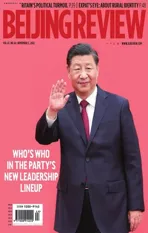The End of an Era
2022-11-15ByLiangXiao
By Liang Xiao
Whether the former chancellor of the exchequer will be the “Chosen One” to turn the tide remains to
be seen
In just four months, the British Conservative cabinet has seen off two prime ministers and replaced four finance ministers. With Rishi Sunak’s victory in the three-day race to become the new Conservative leader on October 24, he became the first prime minister of Indian descent and the youngest one to take office since 1812. But he’s looking at economic problems almost identical to, or even more severe than, those of his predecessor Liz Truss’ administration. Whether the former chancellor of the exchequer will be the“Chosen One” to turn the tide remains to be seen.
Truss formally announced her resignation on October 20 in the face of a hostile opposition and fury from her own Conservative Party, breaking the record for the shortest tenure of a prime minister in modern British political history—44 days.
In the end, Truss failed to become another“Iron Lady” like her political idol Margaret Thatcher. Before taking office, Truss’s militant rhetoric, including her tough attitude toward Russia and China, raised fears that Britain under her leadership would become more deeply involved in geopolitical competition. The reality is Truss hardly had the opportunity to demonstrate her diplomatic strategy during her six-ish weeks in office.
After taking the keys to 10 Downing Street from her predecessor Boris Johnson,Truss faced the primary task of saving Britain from an energy crisis and economic recession. She presented herself as a straight-talker with a clear plan to grow the economy. The Truss administration went on to announce radical outlines for tax cuts,all funded by borrowing, and deregulation.With the country’s ongoing cost-of-living crisis, these strategies sparked much outrage and plunged the situation into chaos with the value of the British pound even sinking to an all-time low against the U.S. dollar at $1.04.
Inflation in Britain had already further intensified. Data released by the Office for National Statistics on October 19 showed that the year-on-year inflation rate in the country had risen from 9.9 percent in August to 10.1 percent in September, reaching the highest level since April 1980; daily necessities such as bread, meat, milk and eggs were at the forefront of the increase.
A survey of 10,495 adults in 47 constituencies conducted by the British Trade Union Congress between September 26 and 30 revealed that 14 percent of residents had been skipping meals or were going hungry because of soaring grocery costs, and more than 44 percent of Brits had been forced to cut back on their food expenditure.
The consequences of failing to address livelihood issues would prove fatal for the Conservative Party—in power for 17 consecutive years. The latest YouGov/Times voting intention poll on October 20-21 showed Labour increasing the enormous lead they’d opened up over the Conservatives:the Conservatives on 19 percent of the vote (-4 percentage points from the previous survey on October 11-12) to Labour’s 56 percent (+5 percentage points).
Sunak probably won’t be able to satisfy the British people, especially those who have experienced the country’s prosperity and stability of the past few decades. As an island nation not rich in natural resources,post-World War II Britain has been known for its well-established social welfare system and relatively high living standards. Relying on its legacy accumulated over the course of centuries and its important position in the existing international order, a steady flow of cheap goods from all over the world and immigrants willing to take on low-paying jobs have, to great extent, contributed to the shaping of British prosperity.
However, no golden age can last forever.The gap between developing and developed countries is narrowing, and developed countries need to pay more to obtain the goods and resources of developing countries. On the other hand, as Britain officially left the European Union in January 2020, it appears to be weakening its ties with major trading partners on the European continent, an action bound to have a profound impact on the country’s economy in the coming years.
The world is experiencing profound shifts unseen in a century. The global energy crisis generated by the Russia-Ukraine conflict and the global inflation triggered by the U.S.’ indiscriminate issuance of money may be just the beginning.
Peace and development may not be the theme of every age, but they are certainly the common aspirations of people everywhere. BR
